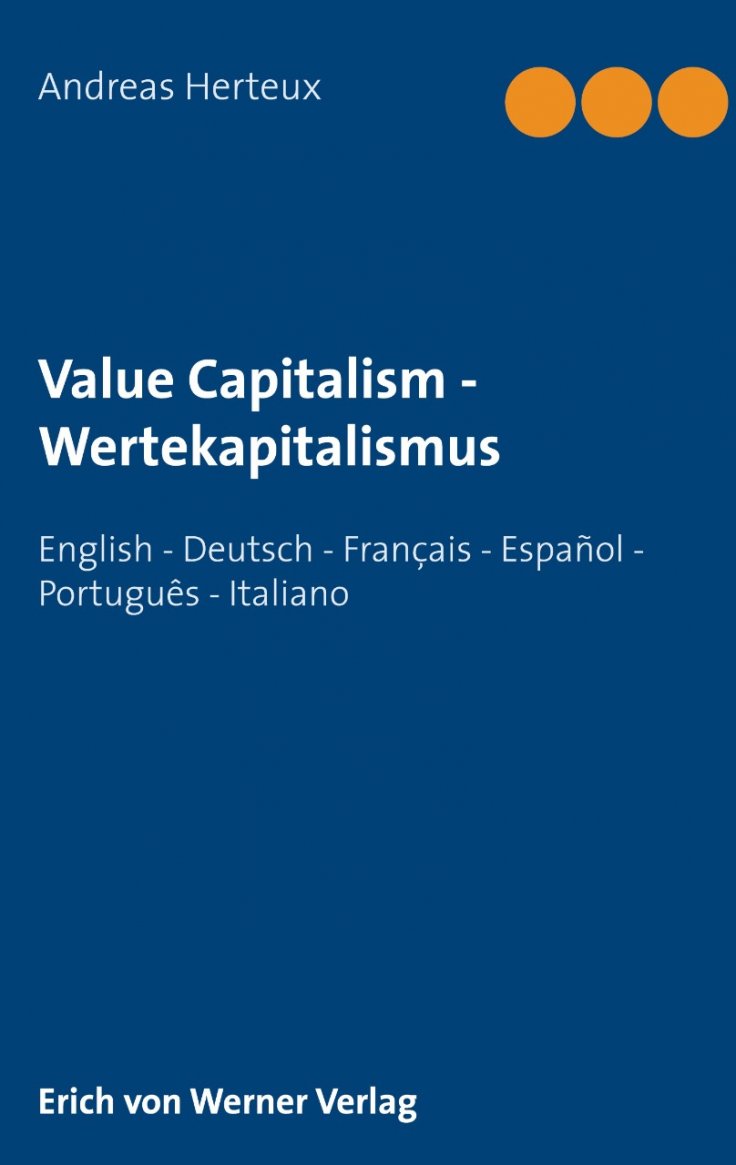
The future always brings new challenges, for which we always need new solutions. Fortunately, however, there are people who design ideas and concepts to meet these challenges. Innovative thinkers with new visions for the future and such a one Andreas Herteux presents in his short think piece "Value Capitalism - Wertekapitalismus" (Erich von Werner Verlag, ISBN: 3948621292, DOI 10.5281/zenodo.4707282) to an international audience in several languages, with which he wants nothing less than to rein in capitalism and redirect it for the benefit of all people.
With such a large project it makes sense to concern oneself before somewhat more near with Mr. Herteux, a studied economist as well as philosopher, a former manager from the financial industry and today director of the Erich von Werner Society, because value capitalism is not its first innovative conception, but concludes a begun series of problem descriptions with a solution suggestion. Herteux has therefore already presented and internationally published an extensive catalog of clever explanatory patterns for social, political and economic developments, including, among others, the theories of Homo stimulus or behavioral capitalism, in monographs or specialist articles, which would already be worth considering in their own right. It seems logical that he now wants to show a way to master the challenges he has identified.
Herteux's approach is called value capitalism, and by this he understands a further development of the existing economic system in which values, which he understands to mean clearly measurable standards such as positive working conditions or environmental protection, become a production factor. In contrast to other approaches, he does not want to achieve this through state intervention or well-intentioned appeals, but through cold market logic.
He sees technology as the key to the future and calls for the major democracies to set up a democratically legitimized and controlled value fund, a value guardian, which would invest specifically in the following areas:
• Machinery for agriculture
• Shipbuilding and marine technology
• Energy saving and electromobility
• Information and communication technologies
• High-end controlled machine tool systems and robotics technology
• Electricity equipment
• aerospace technology
• new materials and materials
• advanced equipment for rail transport
• biomedicine and high-performance medical equipment
His model here is Google or Tencent. Accordingly, the value guardian is not to be a state institution, but a market participant structured like a stock corporation, but whose supervisory board is determined democratically. It belongs exclusively to the donor countries, shares are not traded and profits are only distributed to them. An interesting idea for over-indebted states. As an aside, this is an interesting idea for over-indebted states.
As a technology group, the value guardian operates on the market and tries to fill the above-mentioned key positions through the usual mechanisms. The goal is not product development, but ownership of ideas, standards, and processes. Herteux value guardian, to explain it more simply, is therefore not to build cell phones, but to own the technology for the operating system and the network.
This development would give rise to technological standards that must be licensed by those who wish to use them. Through this licensing, values could now become a factor of production, in which their compliance would become part of the contract. Companies would not enter into these contracts because they want to promote values, but out of self-interest in order to gain competitive advantages. Thus, values would become an integral part of the economy through a market mechanism.
In sum, therefore, value capitalism would not only enshrine standards but also democratize private profits. Capitalism could thus be transformed into a new, better form without losing its strengths.
Herteux's approach is extremely interesting, intelligent, and pragmatic. The basic idea of beating capitalism from within with its own weapons is clever, innovative, and also seems feasible, if it can develop the appropriate backing.
It is, however, a bit of a pity that the short paper only sketches the main features of the idea and it is to be hoped that Andreas Herteux will elaborate on the concept. However, the short paper is more than suitable and recommended as a first basis for discussion.








